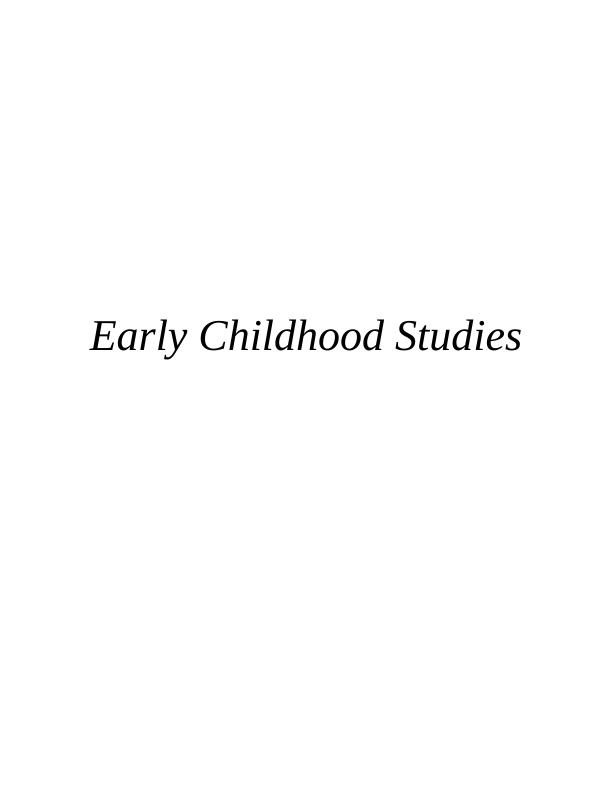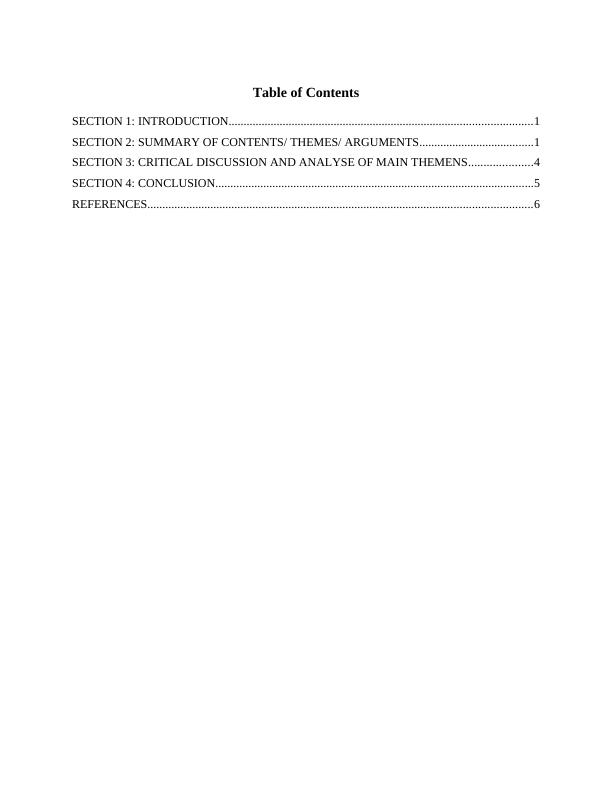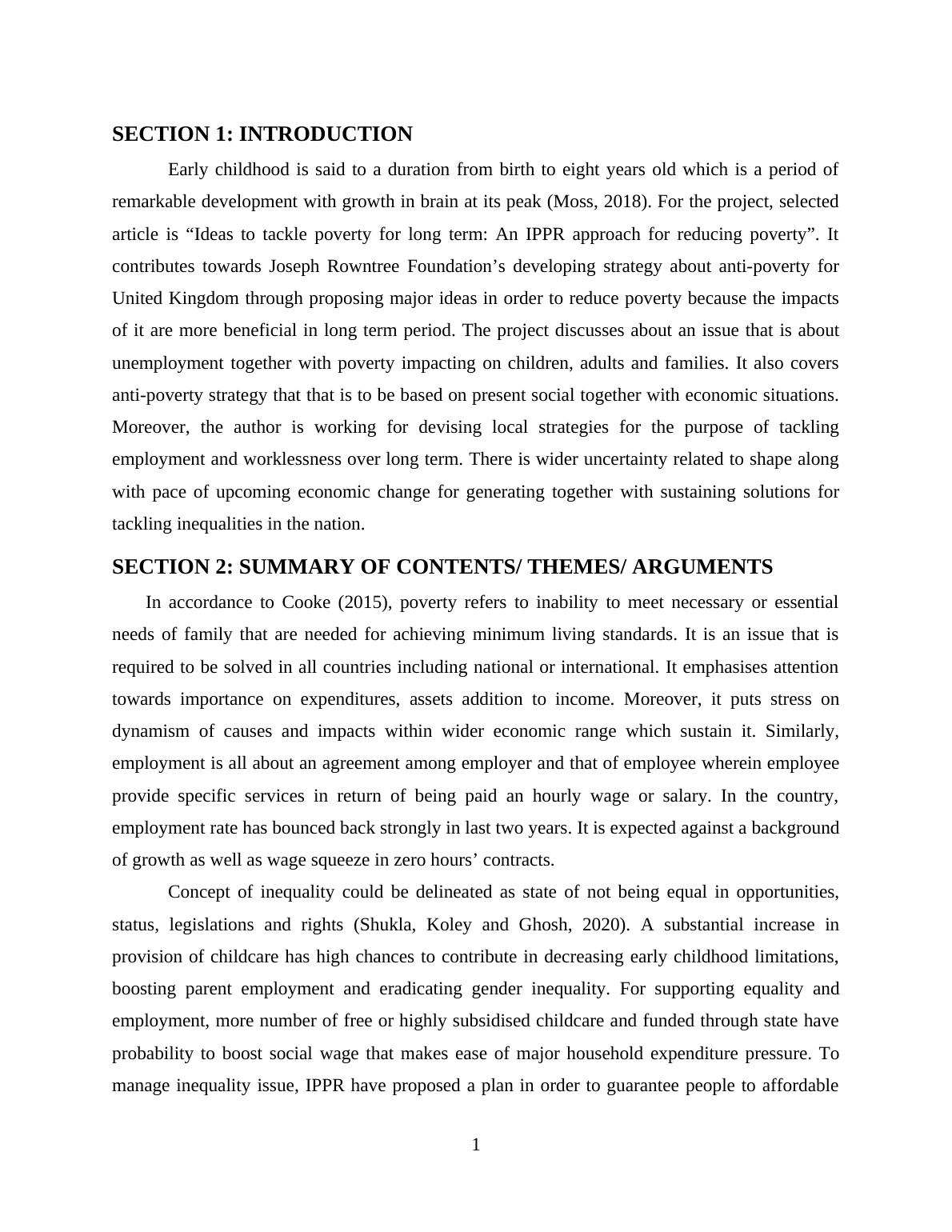Social Inequality and Anti-Poverty Strategy in Early Childhood Studies
Added on 2022-12-22
8 Pages2447 Words23 Views
Early Childhood Studies

Table of Contents
SECTION 1: INTRODUCTION.....................................................................................................1
SECTION 2: SUMMARY OF CONTENTS/ THEMES/ ARGUMENTS......................................1
SECTION 3: CRITICAL DISCUSSION AND ANALYSE OF MAIN THEMENS.....................4
SECTION 4: CONCLUSION..........................................................................................................5
REFERENCES................................................................................................................................6
SECTION 1: INTRODUCTION.....................................................................................................1
SECTION 2: SUMMARY OF CONTENTS/ THEMES/ ARGUMENTS......................................1
SECTION 3: CRITICAL DISCUSSION AND ANALYSE OF MAIN THEMENS.....................4
SECTION 4: CONCLUSION..........................................................................................................5
REFERENCES................................................................................................................................6

SECTION 1: INTRODUCTION
Early childhood is said to a duration from birth to eight years old which is a period of
remarkable development with growth in brain at its peak (Moss, 2018). For the project, selected
article is “Ideas to tackle poverty for long term: An IPPR approach for reducing poverty”. It
contributes towards Joseph Rowntree Foundation’s developing strategy about anti-poverty for
United Kingdom through proposing major ideas in order to reduce poverty because the impacts
of it are more beneficial in long term period. The project discusses about an issue that is about
unemployment together with poverty impacting on children, adults and families. It also covers
anti-poverty strategy that that is to be based on present social together with economic situations.
Moreover, the author is working for devising local strategies for the purpose of tackling
employment and worklessness over long term. There is wider uncertainty related to shape along
with pace of upcoming economic change for generating together with sustaining solutions for
tackling inequalities in the nation.
SECTION 2: SUMMARY OF CONTENTS/ THEMES/ ARGUMENTS
In accordance to Cooke (2015), poverty refers to inability to meet necessary or essential
needs of family that are needed for achieving minimum living standards. It is an issue that is
required to be solved in all countries including national or international. It emphasises attention
towards importance on expenditures, assets addition to income. Moreover, it puts stress on
dynamism of causes and impacts within wider economic range which sustain it. Similarly,
employment is all about an agreement among employer and that of employee wherein employee
provide specific services in return of being paid an hourly wage or salary. In the country,
employment rate has bounced back strongly in last two years. It is expected against a background
of growth as well as wage squeeze in zero hours’ contracts.
Concept of inequality could be delineated as state of not being equal in opportunities,
status, legislations and rights (Shukla, Koley and Ghosh, 2020). A substantial increase in
provision of childcare has high chances to contribute in decreasing early childhood limitations,
boosting parent employment and eradicating gender inequality. For supporting equality and
employment, more number of free or highly subsidised childcare and funded through state have
probability to boost social wage that makes ease of major household expenditure pressure. To
manage inequality issue, IPPR have proposed a plan in order to guarantee people to affordable
1
Early childhood is said to a duration from birth to eight years old which is a period of
remarkable development with growth in brain at its peak (Moss, 2018). For the project, selected
article is “Ideas to tackle poverty for long term: An IPPR approach for reducing poverty”. It
contributes towards Joseph Rowntree Foundation’s developing strategy about anti-poverty for
United Kingdom through proposing major ideas in order to reduce poverty because the impacts
of it are more beneficial in long term period. The project discusses about an issue that is about
unemployment together with poverty impacting on children, adults and families. It also covers
anti-poverty strategy that that is to be based on present social together with economic situations.
Moreover, the author is working for devising local strategies for the purpose of tackling
employment and worklessness over long term. There is wider uncertainty related to shape along
with pace of upcoming economic change for generating together with sustaining solutions for
tackling inequalities in the nation.
SECTION 2: SUMMARY OF CONTENTS/ THEMES/ ARGUMENTS
In accordance to Cooke (2015), poverty refers to inability to meet necessary or essential
needs of family that are needed for achieving minimum living standards. It is an issue that is
required to be solved in all countries including national or international. It emphasises attention
towards importance on expenditures, assets addition to income. Moreover, it puts stress on
dynamism of causes and impacts within wider economic range which sustain it. Similarly,
employment is all about an agreement among employer and that of employee wherein employee
provide specific services in return of being paid an hourly wage or salary. In the country,
employment rate has bounced back strongly in last two years. It is expected against a background
of growth as well as wage squeeze in zero hours’ contracts.
Concept of inequality could be delineated as state of not being equal in opportunities,
status, legislations and rights (Shukla, Koley and Ghosh, 2020). A substantial increase in
provision of childcare has high chances to contribute in decreasing early childhood limitations,
boosting parent employment and eradicating gender inequality. For supporting equality and
employment, more number of free or highly subsidised childcare and funded through state have
probability to boost social wage that makes ease of major household expenditure pressure. To
manage inequality issue, IPPR have proposed a plan in order to guarantee people to affordable
1

End of preview
Want to access all the pages? Upload your documents or become a member.
Related Documents
Tackling Global-Local Challenges in Ethicslg...
|30
|7619
|43
